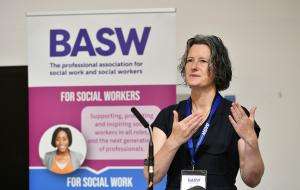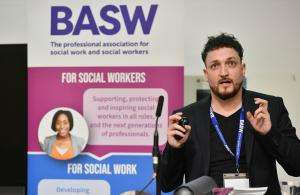'We must strip back the wallpaper of practice and make poverty visible'

Published by Professional Social Work magazine, 22 June, 2022
Social work’s role in making poverty “visible” and advocating for those who experience it was underlined in the opening talk at BASW’s UK conference.
Chair of the association Gerry Nosowska stressed the importance in her last speech before stepping down from leading the association after four years.
She said: “Poverty and inequality is central to our work. It is strongly linked to key priorities around equality, diversity and inclusion and involving experts by experience.
“We have seen in the Covid pandemic the loss and the struggle and impact was so much stronger in deprived areas of the country. That is linked to ethnicity, to jobs, to health.
“We are now going into a cost of living crisis where more and more people find it harder to either escape poverty or are getting drawn into that. We hear from social workers about the human rights issues that is causing.”
Nosowska added: “Social work and BASW have a real scope to act and make a difference. That is partly because we have the motivation. It is part of our purpose and ethos and BASW’s vision to address this. We also have the expertise to work in partnerships and co-production.”
Nosowska highlighted the work of the Child Welfare Inequalities Project which has evidenced the “persistent link” between poverty families face and the risk of harm to children.
She said families often encountered a “maze” of “fragmented services” in which their frustration to gain the help they needed was sometimes seen as “resistance”.
Nosowska cited the work of social work academic professor Kate Morris and others who referred to poverty as becoming the “wallpaper of practice” that is “too big to tackle and too familiar to notice”.
This, she said, also impacted on social workers: “It’s feelings of powerlessness that transfer when children struggle with services coming into social worker’s reality.
“There’s the moral muddle that occurs when you want to acknowledge poverty that’s not really acknowledged and don’t want to stress that people in poverty won’t be able help their children to thrive…”

Dominic Watters, a social work student who campaigns for food security based on his experience as a single father living on a deprived estate, also addressed delegates.
He spoke of being on a placement for 16 to 21-year-olds in semi-independent living who were forced to rely on food donations from local businesses and food banks.
“I started to see the synergies I faced as a single parent in poverty and the people we serve.
“Their lack of access to nutrition was something I was experiencing when I left placement and went home.”
Watters said achieving food security for service users should be “an integral part of social work”.
He is currently working with BASW to have food insecurity included in the Professional Capabilities Framework and is calling on social work regulators to add it to their standards of practise.
BASW’s public and political affairs lead Kerri Prince underlined the difference social work can make through campaigning for change.
She added: “We need to seize the moment while public opinion is on our side.
“We all need to put pressure on our elected politicians. Write to them, attend their surgeries and post on social media.
“Hold them to account and tell them what they need to do to secure your vote. Time and time again we know that public pressure can change policies.”
'I started to see the synergies I faced as a single parent in poverty and the people we serve'Dominic Watters
